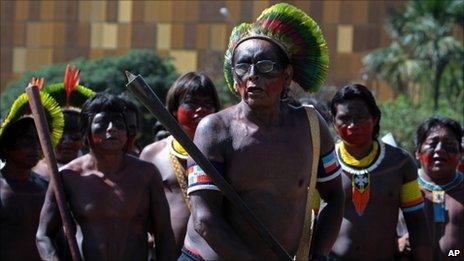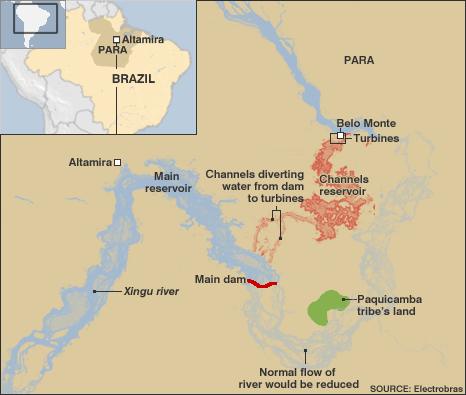Brazil: Indigenous tribes protest against Amazon dam
- Published

Kaiapo Indians make their voices heard outside the National Congress in Brasilia
Hundreds of indigenous Brazilians have been protesting in the capital, Brasilia, against the construction of what will be the world's third biggest hydro-electric dam.
An indigenous leader delivered a petition opposing the project signed by more than half a million people.
Environmentalists say the dam in the Amazon river basin will harm the world's biggest tropical rainforest.
Brazilian Energy Minister Edison Lobao said construction would begin soon.
Mr Lobao said the population which would be affected by the Belo Monte dam would be compensated and resettled.
But indigenous leader Raoni said he was convinced the dam would bring "bad things" to his tribe's villages.
'There'll be war'
"We don't want Belo Monte because it will destroy our rivers, our jungle and our way of life," he added.
Another tribal leader said he and his tribe had not been given enough information about the project.
Ireo Kayapo said that if his tribe were to be driven from its land, "there'll be war and blood will be spilled".
Wearing their traditional headdresses, tribal leaders delivered a petition signed by more than 600,000 people demanding the government scrap the $10bn project.
Licences still have to be granted for the actual building of the plant, but last month Brazilian environment agency Ibama gave the go-ahead for the clearing of the land at the site of the planned dam.
The government says the Belo Monte dam is crucial for development and will create jobs, as well as provide electricity to 23 million homes.
The 11,000-megawatt dam would be the biggest in the world after the Three Gorges in China and Itaipu, which is jointly run by Brazil and Paraguay.
It has long been a source of controversy, with bidding halted three times before the state-owned Companhia Hidro Eletrica do Sao Francisco was awarded the contract last year.
Celebrities such as the singer Sting and film director James Cameron have joined environmentalists in their campaign against the project.
They say the 6km (3.7 miles) dam will threaten the survival of a number of indigenous groups and could make some 50,000 people homeless, as 500 sq km (190 sq miles) of land would be flooded.

- Published27 January 2011